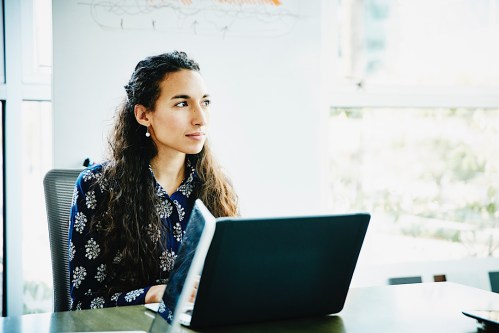The Mental Exercise That’ll Help You Feel More Confident in All Your Decisions
Making decisions is hard, and sometimes you're left with the fear that you've made the wrong one. Feel confident in decisions with this tip.

As humans, there are certain experiences that connect us all. Like, spending an hour trying to find something to watch, ever so often muttering, “oh, that looks kinda interesting” before clicking to the next suggestion…only to end up watching re-runs of a favorite show while also looking at your phone. Decisions are hard, even if they feel like they should be simple. And a multitude of things can affect our decision-making abilities, from being hungry (seriously, it’s a thing) to feeling anxious. Oh yeah, and the pandemic caused nearly a third of us to experience “decision paralysis,” which is exactly what is sounds like—the struggle to make decisions, even small ones. And when you do make up your mind about something, it can be difficult to feel confident in decisions.
Some light at the end of the tunnel: Decisiveness is a trait that you can learn, and it is possible to not only make choices, but feel confident that we’ve made the best ones for ourselves. Decisions feel right to us “if we have compared the options as attentively as possible—and if we are conscious of having done so,” according to new research published earlier this month in ScienceDaily.
Unfortunately for myself and my fellow overthinkers, this doesn’t have so much to do with the quantity of time you spend weighing the possible outcomes of a decision. It’s more about self-awareness and introspection. Researchers discovered that “the ability to question and revise poor decisions depends on how well we are able to judge for ourselves whether we thoroughly weighed up the options or allowed ourselves to be distracted during the decision-making process.”
Though a small study (just 35 participants), it provides valuable insight into decision-making processes. For the study, participants were shown pictures of food items. Each item was presented individually, and they were asked to rate how much they wanted to eat it. Then participants were shown pictures of two food items at a time, and asked to choose which one they would prefer to eat and then rate their confidence in their decision. Then they ate the items they chose. The researchers used an eye scanner to observe the eye movement patterns of the subjects in order to determine how much thought was put into each decision. They used this data, plus data from similar research, to develop a computer program.
“We discovered that people are particularly likely to have a bad feeling about a decision if they introspect that they didn’t pay enough attention to comparing the different options,” says Rafael Polanía, a professor at ETH Zurich, the Swiss Federal Institute of Technology, and head of the study. But, he says, we can train ourselves to be more introspective through practices like mindfulness exercises and meditation.
Oh hi! You look like someone who loves free workouts, discounts for cutting-edge wellness brands, and exclusive Well+Good content. Sign up for Well+, our online community of wellness insiders, and unlock your rewards instantly.
Sign Up for Our Daily Newsletter
Get all the latest in wellness, trends, food, fitness, beauty, and more delivered right to your inbox.
Got it, you've been added to our email list.










